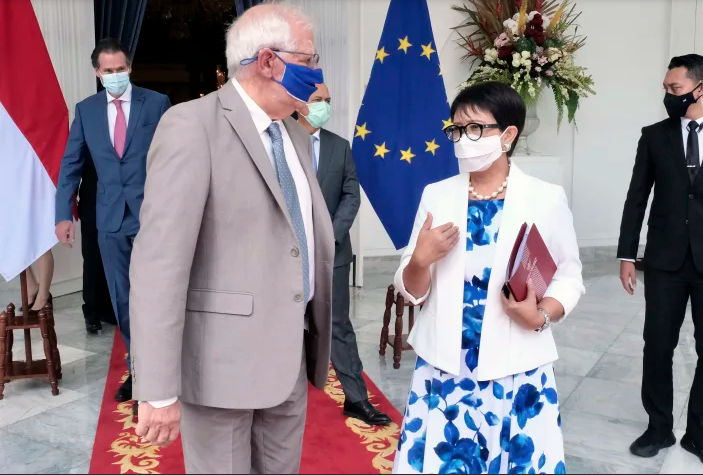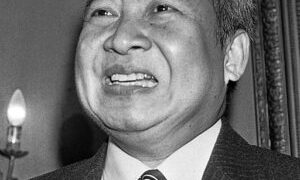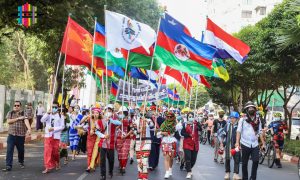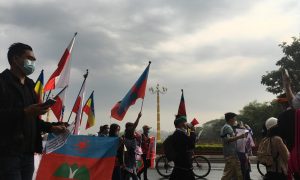The tragedy of what appears could be a long-running civil war remains a distinct possibility in Myanmar today. Nevertheless, the term “civil war” itself is inappropriate. Rather Myanmar today resembles Europe during the Nazi occupation. While the sense of occupation by a foreign force had always existed in the ethnic minority areas with their well-armed insurgent organizations, there is a sense today that this is also the case in the Bamar heartland. The occupying army is Myanmar’s own national army (the Tatmadaw) which, from its foundation, has largely functioned as an autonomous state within a state. Those civilians who support the military, such as the members of the USDP, are treaters as collaborators.
Seen even from the conventional paradigm of military coups replacing a democratically elected government the reaction of the international community, and above all the “West”, is disappointing. Yet, once we change perspective to conceive of Myanmar as an occupied country then the reaction of the international community is simply irresponsible. To use a metaphor, Myanmar today is an international orphan. This is not to say, to pursue the analogy, it does not have a family. This ‘family’, in our view, can be divided into three: the kindly, but unengaged aunts, the self-serving and self-indulgent uncles and the feckless cousins.
The kindly, unengaged aunts
The first group, of kindly but unengaged aunts, is a caricature of the United States, the EU and the United Kingdom. Other countries, particularly the other three members of the Quad—Australia, India and Japan—can be considered part of this grouping. Certainly, they rapidly condemned the coup and, in some cases, introduced targeted sanctions against the generals and their immediate families. These were later reinforced to include military-linked conglomerates.
In recent years their political leaderships have heralded a pivot towards the Indo-Pacific with the aim, declared in various official strategy papers, of promoting democracy and confronting autocracy. By not making Myanmar a priority concern in their democratic Indo-Pacific posturing they have revealed the emptiness of these pompous declarations. Is there any post-coup situation in the world today of any greater moral clarity?
The failure of the Australian government to even introduce a basic system of targeted sanctions is puzzling. Cynically, in the context of Sino-Australian tensions doing so would send a clear message to Beijing on the unacceptability of its support for authoritarian regimes, while not being seen to directly criticize the PRC itself. The Morrison governments hesitancy to even provide permanent resident status to the 3,000 or so Burmese students in Australia represents a repudiation of Canberra’s bipartisan principled middle power tradition dating back to Dr Evatt.
This attitude is understandable from Narendra Modi in India in the light of his own autocratic ethno-nationalist agenda. However, it represents the betrayal of the Nehru tradition in foreign policy and, in realpolitik terms, is counterproductive given the continuing aggravation in Sino-Indian relations. Is it really in Delhi’s interest to see Mizoram and Manipur destabilized through a further influx of Myanmar refugees? In the context of Sino-Indian hostility is it in Delhi’s interest to see the PRC providing recognition, and carving out new economic benefits, with the Myanmar junta? It is puzzling why India’s vaunted Look East Policy does not begin with its closest eastern neighbour but, so far, the Indian government has even prevented the Quad from making a clear statement on the release of political prisoners. India abstained in the 18th June vote in the UN General Assembly demanding an arms embargo and he release of political prisoners, unlike the other three Quad members who voted yes. Yet for Quad members, with their principle objective of constraining China, Myanmar is of secondary importance. This, once again is amazingly short-sighted: constraining, but also cooperating with China for mutual benefit, begins in Myanmar.
The United States bears, at least indirectly, responsibility for the coup. It was the leader of the world’s greatest democracy, President Donald Trump, himself who in propagating the Big Lie of a stolen US presidential election in November 2020 provided a rhetorical fig-leaf for would be dictators everywhere to justify their actions. Certainly, in the Myanmar case it gave occasion for Senior General Min Aung Hlaing to play by the Thai playbook and undertake a coup in order to defend democracy against democratic irregularities, corruption, etc. with a vague promise of “free and fair” elections in the future.
The junta is implementing the next steps in the Thai playbook in using a subservient and compliant judicial system to imprison the leaders of the democratic opposition, making Aung San Suu Kyi ineligible to run again. As with the Future Forward Party in Thailand, the banning and dismantling of Myanmar’s National League for Democracy, is just a matter of time.
The Biden Administration’s overwhelming priority is the strengthening and reinvigorating of alliances in Europe and in the Indo-Pacific, to both constrain China and check Russia. Objectively drawing a redline in Myanmar would be a concrete way of achieving these multiple objectives but, alas, with the withdrawal from Afghanistan and other overriding issues, Myanmar remains largely invisible in the “Washington beltway”
In Europe as a result of Brexit, Myanmar no longer has a champion in the “Brussels bubble” and even in the United Kingdom, the PRC’s turpitude in Hong Kong is the key Asian issue, alongside mercantilist policies to promote a Global Britain. Elsewhere in the European Parliament political representatives would rather spend their time making rhetorical points on the Uighur and Hong Kong, than come to the aid of the Myanmar people who overwhelmingly ask for their support.
How can this be explained? We would suggest that the close link in Western eyes between the person of Aung San Suu Kyi and Myanmar’s democratic trajectory has been a double-edged sword. When she was under house arrest and in opposition, she was perceived as incarnating the democratic aspirations of the Myanmar people and maintained these in the arena of public debated. However, when the democratic icon of the 1990s and 2000s fell from her pedestal due to both her autocratic demeanour and, above all, her defence of the Tatmadaw against charges of genocide in the International Criminal Court, concern with Myanmar evaporated. The orphan baby of Burmese democracy was thrown out, so to speak, with the bathwater of personality-centred politics.
Rather than acting decisively on Myanmar, the “kindly but unengaged aunts” have has chosen to delegate the resolution of the Myanmar crisis to the “feckless cousins” of ASEAN discussed below. In Europe this appeals to the somewhat narcissistic encouragement of regional integration elsewhere as well as the hubris surrounding interregionalism. As the world’s most institutionalized regional entity the EU has a rather optimistic view of its oldest regional partner, ASEAN. Yet, to date none of the mechanisms provided in this partnership—such as EU-ASEAN parliamentary dialogue or the ASEAN Strategic Partnership Agreement—have been activated.
The self-interested and self-indulgent uncles
The second part of the family is the self-interested and self-indulgent uncles, namely China and Russia. While it is debatable whether Beijing encouraged the coup, it is clear that since it has been most accommodating in providing recognition to the junta. The PRC has legitimate security, especially energy security, interests in Myanmar and real concerns about instability on its southern borders. The paradox is that these would best be protected under a civilian administration supported by the people of Myanmar than by a Sinophobic and incompetent junta. Yet, as with Modi’s India, Beijing’s ideological blinkers on the benefits of authoritarianism has meant that the PRC is not the loveable country Xi Jinping seeks to project.
Russian behaviour in Myanmar, namely ensuring sales of its weaponry and promoting Putin’s autocratic agenda worldwide, is more perfidious and self-indulgent. Like in the Donbass and Belorussia, Myanmar provides an occasion for Putin’s macho promotion of Russia as a great power. Having largely lost both Vietnam and now India to the West, Moscow is left with Naypyidaw and Vientiane as its last Asian playgrounds.
The feckless cousins
Finally, the third group is the feckless cousins, Myanmar’s Southeast Asian neighbours of ASEAN, to whom the international community has bestowed responsibility to resolve the crisis. In our view, this misconceived sub-contracting is premised on the vague notion of ASEAN’s regional centrality. Yet, it is one thing to pay lip service to “ASEAN centrality” out of diplomatic politeness. It is another thing to actually believe that it can bring results. “Centrality” is a question of positioning and, indeed, by default ASEAN has been the core around which other regional bodies such as the East Asia Summit, the ASEAN Regional Forum, APEC, the RCEP, etc, have been grafted. But “centrality” per se indicates to us nothing about capability or capacity, let alone political willingness.
It took almost three months after the coup for ASEAN on 24th April to organise a summit on Myanmar to which the junta leader, and he alone, was invited. Five months after the coup ASEAN’s promised special envoy has not been appointed both due to internal failure to agree on a candidate and a lack of approval from the junta itself . All ASEAN has achieved so far is to provide de facto legitimacy to the junta and buy it time. At both its emergency summit of 24 April and in the visit of two of its emissaries on 5 to 7 June, ASEAN has given legitimacy to the junta, without even any contact with the democratically elected leaders in Myanmar. It is hard to see how an even-handed dialogue can be organised between the jailers and the jailed, as calls from Indonesia, Malaysia, and Singapore for the release of political prisoners have gone unheeded.
ASEAN has been successful over 50 years in maintaining peace between its members. However, it has neither the “carrots” nor “the sticks” to bring about change within one of them. For example, under the 2008 ASEAN Charter there are no provisions for any member to be expelled. Above all, the sacrosanct, and self-serving, principle of non-interference will always negate the application of the seventh of the Charter’s purposes and principles: the strengthening of democracy and the promotion and protection of human rights and fundamental freedoms.
Moreover, not only is there a serious systemic issue, but there is also clearly a lack of political will to promote a return to democracy in Myanmar: the majority of ASEAN members have authoritarian or semi-authoritarian regimes. What is the interest of the Thai master of coups, ex-General, now PM Prayut, in seeing the Burmese civil disobedience movement succeed? Would it not further encourage the Thai members of the Milk Tea Alliance who periodically occupy the streets of Bangkok to continue denouncing a kindred patriarchal regime? Does the Politburo of the Vietnamese Communist Party want to see netizens succeed in virtually challenging an authoritarian regime? As for Cambodian PM Hun Sen, and Philippines President Rodrigo ‘Digong’ Duterte, aka The Punisher, democratic values are the least of their concerns. Finally, ASEAN is chaired at the moment by the Sultan of Brunei, the last remaining absolute monarch in Asia.
The divisions within ASEAN came into focus during the non-binding vote in the UN General Assembly on 18 June, calling for an arms embargo and the release of political prisoners (item 34-A/75/L.85.Rev. 1). Six ASEAN countries voted yes: Indonesia, Malaysia, Myanmar itself, the Philippines, Singapore and Vietnam. The other four—Brunei, Cambodia, Laos and Thailand—abstained. Divisions of this kind within a regional entity based on the principle of consensus have only one result: procrastination and a degree of immobilism, otherwise known as the ASEAN Way.
Conclusions
When an orphan’s extended family fails lamentably, fortunately there is an alternative: turning to your friends. In the countries of the “kindly and unengaged aunts” their parliaments—for example the French Senate, the US Congress and the Australian Parliament—pushing for more assertive action from their country’s respective executives. Civil society groups in Southeast Asia increasingly see the combat for Myanmar’s democracy as their own. In the West a vocal Burmese diaspora, advocacy groups, academics and other supporters are pushing to ensure that this orphan is not forgotten. It remains a moot point whether this will lead to concrete and tangible actions, such as the recognition of the National Unity Government, and international intervention of the basis of the Right to Protect will ensue.
 Facebook
Facebook  Twitter
Twitter  Soundcloud
Soundcloud  Youtube
Youtube  Rss
Rss 


